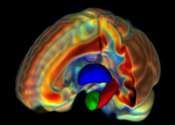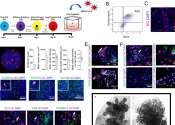New biomaterial regrows damaged cartilage in joints
Northwestern University scientists have developed a new bioactive material that successfully regenerated high-quality cartilage in the knee joints of a large-animal model.
Aug 5, 2024
1
1252
The Proceedings of the National Academy of Sciences of the United States of America, usually referred to as PNAS, is the official journal of the United States National Academy of Sciences (NAS). PNAS is an important scientific journal that printed its first issue in 1915 and continues to publish highly cited research reports, commentaries, reviews, perspectives, feature articles, profiles, letters to the editor, and actions of the Academy. Coverage in PNAS broadly spans the biological, physical, and social sciences. Although most of the papers published in the journal are in the biomedical sciences, PNAS recruits papers and publishes special features in the physical and social sciences and in mathematics. PNAS is published weekly in print, and daily online in PNAS Early Edition. PNAS was established by NAS in 1914, with its first issue published in 1915. The NAS itself had been founded in 1863 as a private institution, but chartered by the US Congress, with the goal to "investigate, examine, experiment, and report upon any subject of science or art." By 1914, the Academy was well established.
Northwestern University scientists have developed a new bioactive material that successfully regenerated high-quality cartilage in the knee joints of a large-animal model.
Aug 5, 2024
1
1252

In a study, published in the journal The Proceedings of the National Academy of Sciences, a molecule identified and synthesized by UCLA Health researchers was shown to restore cognitive functions in mice with symptoms of ...
Aug 8, 2024
0
449

A team of neuroscientists and behavioral specialists affiliated with several institutions in the U.S., working with one colleague from New Zealand and another from Canada, has found differences between male and female brain ...

Multiple sclerosis (MS) degrades the protective insulation around nerve cells, leaving their axons, which carry electrical impulses, exposed like bare wires. This can cause devastating problems with movement, balance and ...
Aug 5, 2024
0
56

Injuries, infection and inflammatory diseases that damage the spinal cord can lead to intractable pain and disability. Some degree of recovery may be possible. The question is, how best to stimulate the regrowth and healing ...
Aug 2, 2024
0
107

For decades, scientists have focused on how the brain processes information in a hierarchical manner, with different brain areas specialized for different tasks. However, how these areas communicate and integrate information ...
Aug 12, 2024
0
104

Researchers in the lab of Jean Cook, Ph.D., chair and professor in the Department of Biochemistry and Biophysics, have identified the cellular processes that occur when you take a cancer drug meant to stop rapid cell growth ...
Jul 19, 2024
0
42

If you're trying to keep drivers from picking up their phones, make it a game, according to a new study led by researchers from the Perelman School of Medicine at the University of Pennsylvania. When drivers could earn points ...
Jul 29, 2024
0
97

A study reported in Proceedings of the National Academy of Sciences (PNAS) shows how the presence of a specific protein called IL-22BP affects the composition of the gut microbiota and the body's response to bacterial infection.
Jul 29, 2024
0
46

Scientists at Sanford Burnham Prebys, University of California San Diego and their international collaborators have reported that more types of lung cells can be infected by SARS-CoV-2 than previously thought, including those ...
Jul 23, 2024
0
38
